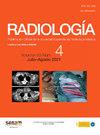放射科专家和住院医师对人工智能的看法
IF 1.1
Q3 RADIOLOGY, NUCLEAR MEDICINE & MEDICAL IMAGING
引用次数: 0
摘要
背景和目的本研究的目的是调查放射科医生在日常工作中使用人工智能(AI)的观点,并确定限制其常规实施的因素。材料和方法西班牙委员会认证的放射科医生和受训人员完成了一项关于放射学中一般信息和通信技术(ICT)和人工智能的21个问题的在线调查。对性别、年龄、职业经验等分组进行分析。p值的关联<;0.05认为有统计学意义。结果共102名放射科医师和实习医师完成问卷调查。年龄和性别之间没有明显的统计学差异。ICT和人工智能知识在不同年龄组之间存在显著差异,40岁以下的参与者和40 - 55岁的参与者表现出更好的ICT知识(p<;0.01)。调查结果显示,77.4%的参与者认为人工智能代表了未来放射专业的机会,而9.8%的人认为它不会产生影响。提出了人工智能在放射学中的三个主要实际应用领域:筛查(23.36%)、图像解释和报告(21.17%)、成像请求和患者调度(14.6%)。被调查者最关心的是工作量可能增加。结论西班牙放射科医生对人工智能持积极态度,大多数人认为人工智能在不久的将来可以为放射专业提供机会。人工智能培训项目可能会进一步提高其在专业人士中的接受度。本文章由计算机程序翻译,如有差异,请以英文原文为准。

Opiniones de los especialistas y residentes de radiología sobre la inteligencia artificial
Background and objectives
The purpose of this study was to investigate perspectives held by radiologists on the use of artificial intelligence (AI) in their day-to-day work and to identify factors limiting its routine implementation.
Materials and methods
Spanish board-certified radiologists and trainees completed an online survey of 21 questions on general information and communications technology (ICT) and AI in radiology. Analysis was carried out for the subgroups of gender, age, and professional experience. Associations with a p-value < 0.05 were considered statistically significant.
Results
A total of 102 radiologists and trainees completed the questionnaire. No significant statistical differences between the age groups or gender were observed. A significant difference was detected in ICT and AI knowledge between age groups, with participants under 40 and those between 40–55 years old demonstrating better ICT knowledge (p< 0.01). The survey results revealed that 77.4% of participants believed that AI represents an opportunity for the radiology profession in the future, while 9.8% believed it would have no impact. Three main practical application areas for AI in radiology were proposed: in screening (23.36%), in image interpretation and reporting (21.17%), and in the requesting of imaging and patient scheduling (14.6%). The biggest concern among the surveyed population was the potential increase in workload.
Conclusions
A positive attitude toward AI was observed among Spanish radiologists, with the majority believing that AI could offer opportunities for the radiology profession in the near future. AI training programmes may further improve its acceptance among professionals.
求助全文
通过发布文献求助,成功后即可免费获取论文全文。
去求助
来源期刊

RADIOLOGIA
RADIOLOGY, NUCLEAR MEDICINE & MEDICAL IMAGING-
CiteScore
1.60
自引率
7.70%
发文量
105
审稿时长
52 days
期刊介绍:
La mejor revista para conocer de primera mano los originales más relevantes en la especialidad y las revisiones, casos y notas clínicas de mayor interés profesional. Además es la Publicación Oficial de la Sociedad Española de Radiología Médica.
 求助内容:
求助内容: 应助结果提醒方式:
应助结果提醒方式:


